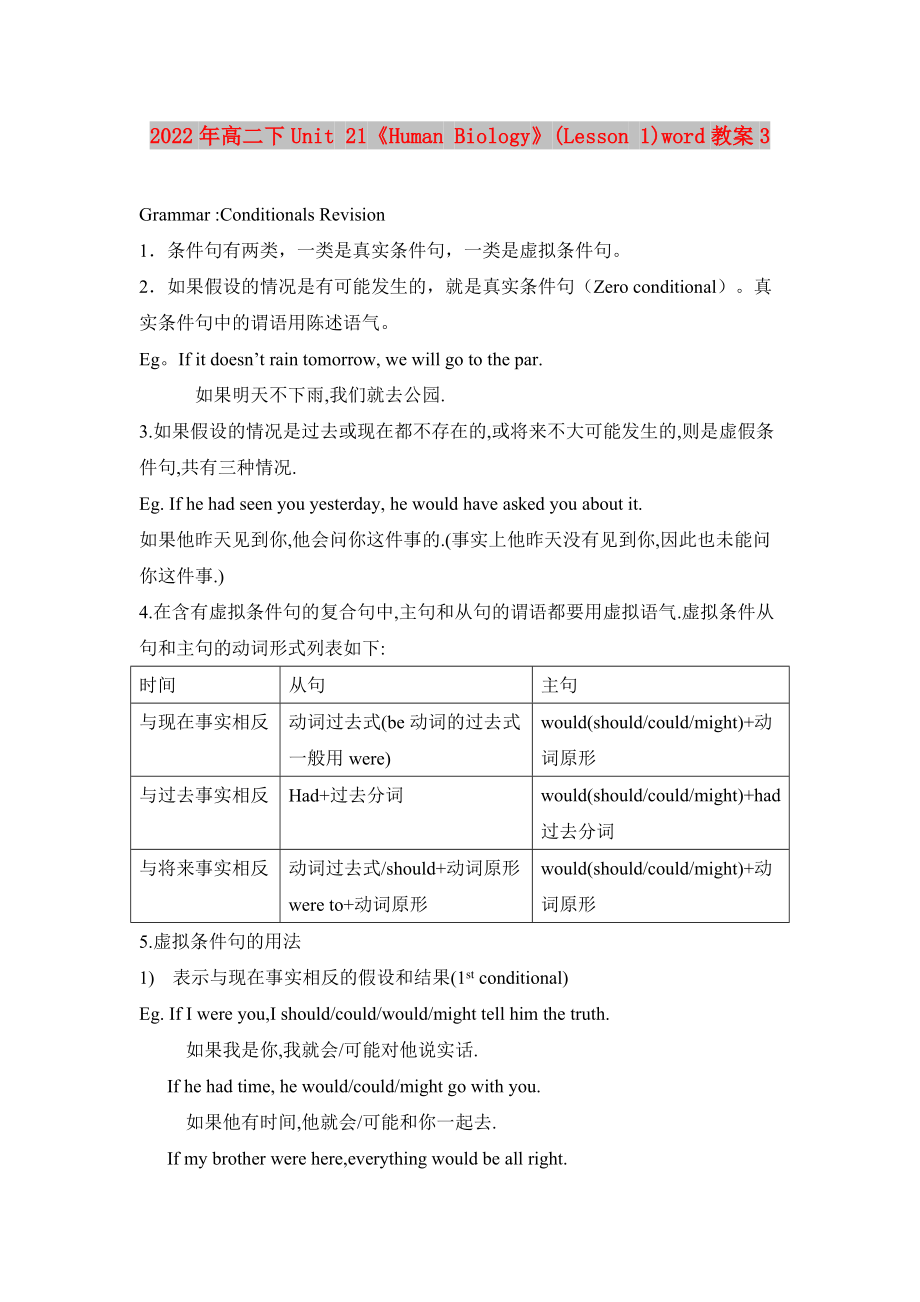《2022年高二下Unit 21《Human Biology》(Lesson 1)word教案3》由會(huì)員分享�,可在線閱讀,更多相關(guān)《2022年高二下Unit 21《Human Biology》(Lesson 1)word教案3(2頁(yè)珍藏版)》請(qǐng)?jiān)谘b配圖網(wǎng)上搜索����。
1、2022年高二下Unit 21《Human Biology》(Lesson 1)word教案3
Grammar :Conditionals Revision
1.條件句有兩類(lèi)���,一類(lèi)是真實(shí)條件句��,一類(lèi)是虛擬條件句。
2.如果假設(shè)的情況是有可能發(fā)生的��,就是真實(shí)條件句(Zero conditional)�。真實(shí)條件句中的謂語(yǔ)用陳述語(yǔ)氣����。
Eg��。If it doesn’t rain tomorrow, we will go to the par.
如果明天不下雨,我們就去公園.
3.如果假設(shè)的情況是過(guò)去或現(xiàn)在都不存在的,或?qū)?lái)不大可能發(fā)生的,則是虛假條件句,共有三種情況.
Eg. If
2��、 he had seen you yesterday, he would have asked you about it.
如果他昨天見(jiàn)到你,他會(huì)問(wèn)你這件事的.(事實(shí)上他昨天沒(méi)有見(jiàn)到你,因此也未能問(wèn)你這件事.)
4.在含有虛擬條件句的復(fù)合句中,主句和從句的謂語(yǔ)都要用虛擬語(yǔ)氣.虛擬條件從句和主句的動(dòng)詞形式列表如下:
時(shí)間
從句
主句
與現(xiàn)在事實(shí)相反
動(dòng)詞過(guò)去式(be動(dòng)詞的過(guò)去式一般用were)
would(should/could/might)+動(dòng)詞原形
與過(guò)去事實(shí)相反
Had+過(guò)去分詞
would(should/could/might)+had過(guò)去分詞
與將來(lái)事實(shí)相反
3�、
動(dòng)詞過(guò)去式/should+動(dòng)詞原形
were to+動(dòng)詞原形
would(should/could/might)+動(dòng)詞原形
5.虛擬條件句的用法
1)????? 表示與現(xiàn)在事實(shí)相反的假設(shè)和結(jié)果(1st conditional)
Eg. If I were you,I should/could/would/might tell him the truth.
如果我是你,我就會(huì)/可能對(duì)他說(shuō)實(shí)話(huà).
If he had time, he would/could/might go with you.
如果他有時(shí)間,他就會(huì)/可能和你一起去.
If my
4、brother were here,everything would be all right.
要是我哥哥在這兒,一切都沒(méi)問(wèn)題了.
2)????? 表示與過(guò)去事實(shí)相反的假設(shè)和結(jié)果(2nd conditional)
Eg. If you had taken my advice, you wouldn’t/couldn’t have failed in the exam.
如果你按照我的建議去做,你不會(huì)/不可能考試不及格.
If I had had the money last week,I should/would/could/might have bought
5����、 a car.
如果我上星期有了這筆錢(qián),我就會(huì)/可能買(mǎi)輛車(chē).
She would/could/might have telephoned you immediately,if she had won the game
如果她比賽贏了,她就會(huì)/可能給你打電話(huà)
If you had e a few minutes earlier, you would/could/might have met the famous singer.
如果你早來(lái)幾分鐘的話(huà),你就會(huì)/可能會(huì)見(jiàn)到那個(gè)著名的歌唱家.
3)????? 表示與將來(lái)事實(shí)可能相反的假設(shè)和結(jié)果(3rd c
6、onditional)
Eg. If it were Sunday tomorrow, I should/would/could/might go to see my grandmother.
如果明天是星期天,我就/可能去看我的奶奶.
If it were to snow this evening,they would not go out.
如果今晚下雪,他們就不出去了.
If it should rain,the crops would/could/might be saved.
如果下雨,莊稼就一定/可能有救.
6.主,從句的動(dòng)作發(fā)生時(shí)間
7��、不一致的情況(mixed conditional)
有時(shí)條件從句中的動(dòng)作和主句中的動(dòng)作發(fā)生的時(shí)間不一致,這時(shí)動(dòng)詞的形式要根據(jù)它所表示的時(shí)間加以調(diào)整.
Eg. If you had listened to the doctor, you would be all right now.
如果你當(dāng)初聽(tīng)了醫(yī)生的話(huà),身體現(xiàn)在就好了.(從句動(dòng)作指過(guò)去,主句動(dòng)作指現(xiàn)在)
If you had practiced speaking English more, you would be able to speak it fluently.
如果你多練習(xí)講英語(yǔ),現(xiàn)在就能講得很流利了
 2022年高二下Unit 21《Human Biology》(Lesson 1)word教案3
2022年高二下Unit 21《Human Biology》(Lesson 1)word教案3

